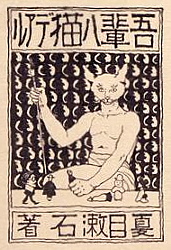I Am a Cat

How I came across it
A few months ago, I put together a list of historical Japanese writers from late-19th to early 20th centry, whose work I hoped to read and learn more about. These were writers whose names I knew, but had only read a couple of their works at best, often just for class assignments. I don’t remember the exact reason why I wrote up this list in the first place, but maybe it was long time coming, since I’ve been nurturing a passion for history and literature for the past couple of years. It was only natural to combine the two and enjoy historical literature. Natsume Soseki was one that easily made the list. He is one of the most famous writers of all time, perhaps with the help of his face being printed on the ¥1000 (~$10) bill. (This was certainly how I first learned about him lol.)
Setup and significance
Soseki’s debut novel titled I Am a Cat is one of his most famous works. The story is narrated in the perspective of a cat, living with a man who teaches English for a living. The cat makes observations, often comical, about its owner’s behaviors with the intelligence of a well-educated human, although the humans don’t suspect a thing, assuming that the cat does not understand any of their “higher-animal” matters. The book is a sattire on Japanese society at the time (1905), which was going through levels of changes that are unimaginable in our current world - Japan was a “closed country” between 1639 and 1854, meaning everyday people had very little knowledge or influence of the west. Then came the Americans with their big guns, demanding to open up lol, which led to a sudden inpour of western culture and its associated values. Soseki portrayed the volatile blending of western and Japanese cultures as well as cautioned against hastily throwing out traditional Japanese values to then blindly accept new western values without questioning.
Parts that I enjoyed
What I enjoyed the most about this work was the cat’s humorous observations of the humanly behaviors of its owner. The cat is always there to witness and make comments (to the reader) when the owner is a little greedy, snobbish, lazy, jealous, or stubborn. For example, here’s a (completely amateur and probably terrible translation of an) exerpt from the first chapter:
I don't see my owner very often. I hear that he is a teacher. When he gets back from work, he locks himself in his study and doesn't come out. Family members think he is quite hard-working, and he thinks that he is quite hard-working himself. However, he's actually not the hard worker that they think he is. When I sneak into his study, I often catch him sleeping at his desk. Sometimes he is drooling on an open book that he was presumably reading. Also, he has a bad stomach and suffers from indigestion. In spite of this, he often helps himself to a heaping portion of a meal. And he takes stomach medicine afterwards. Then he opens up a book to read, but gets drousy after a few pages. So he starts drooling on the pages again. This is his nightly routine. I know I am just a cat, but I often think to myself: how easy must life be as a teacher! If I were ever reborn as human, I would certainly become a teacher myself. If all this sleeping is what teachers do, cats could very well become teachers as well. Nevertheless, my owner claims that nothing is harder than being a teacher, and doesn't cease to complain to his friends whenever they are over.
Is it just me that sympathizes greatly with the owner?! I found it cathartic and entertaining to read the snarky but matter-of-fact comments by the cat that describes the silly behaviors that I sometimes find myself engaging in. In my opinion, these comically irrational behaviors are very human. It also brought me joy to learn that people from 100 years ago struggled with laziness the same way that I do today. (When I spoke to a friend about this, they actually found this discouraging, as their takeaway was that humans haven’t made progress. Interesting how people see it differently! My personal takeaway was my connection to humanity beyond time, which was uplifting.)
Another funny element was how, for example, the cat loves to make snarky comments about any snobbishness of its owner, while he himself is also fairly snobbish in the reader’s meta-perspective. I felt that this gives us perspective on how we often comment on others while turning a blind eye to our own faults!
I did find the commentary on the westernization of Japan intriguing as well. For example, here is a passage from the teacher’s friend’s monologue towards the end of the book. Regarding the spread of individualism through westernization:
So the individual became much stronger. But since everyone became equally stronger, this means that everyone became equally weaker. You are stronger in that other people cannot interfere with you, but you are weaker in that you cannot interfere with others. Everyone likes getting stronger but no one likes getting weaker, so people desperately protect their personal space from interference, while attempting to covering for their weak parts by trying to interfere with others'. This leaves no space between people, and things get cramped up. The individuals expand their personal space as much as possible, leaving themselves suffering on the verge of bursting.
Conclusion
I hope you enjoyed my summary and thoughts on Soseki’s I Am a Cat! I felt the novel definitely lives up to its reputation. It was a novel in which the humorous sattire that makes you laugh out loud coexist with the sharp societal sattire that leaves you in contemplation. I hope to write more about his other works so stay tuned!